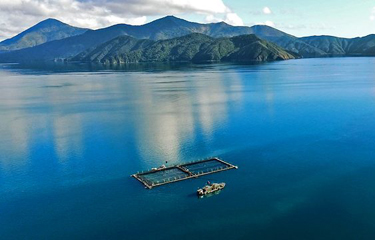New Zealand King Salmon shifting to open-ocean farming

New Zealand King Salmon is looking to expand its aquaculture operations into the open ocean.
The Nelson, New Zealand-based company has applied to the Marlborough District Council for a 35-year resource consent to build open-ocean king salmon farms north of Marlborough in the Cook Strait.
New Zealand King Salmon (NZKS) produces premium king salmon salmon sold through four brands: Ōra King, Regal, Southern Ocean, Omega Plus, and the New Zealand King Salmon label.
“This is an incredibly exciting opportunity for our company, our region, and the aquaculture industry,” CEO Grant Rosewarne said. “We’ve named our first open ocean farming project Blue Endeavour to signify the future-focused strategy we’re putting in place to harness the ocean’s potential in a sustainable way. The pens on these farms will be so spacious that we’re calling them sea ranges.”
If the company’s application is approved, it hopes to open the farm by the end of 2020 or the beginning of 2021, with the first harvest scheduled for 12 to 18 months later. The application also allows for the creation of a second farm in the same area, for an eventual production total of 8,000 metric tons (MT) of king salmon per 18-month cycle.
In a press release, NZKS said it expects to spend NZD 25 million to NZD 30 million (USD 16.1 million to 19.3 million, EUR 14.3 million to EUR 17.2 million) to build out vessels and pen infrastructure adequate for the open ocean.
“With over four hundred million hectares of ocean space on New Zealand’s doorstep – the fourth largest marine exclusive economic zone in the world – farming a tiny proportion of the ocean could provide a significant future source of healthy, sustainable protein,” the company said. “In addition to positive environmental and social benefits, the open ocean farms proposed within this application will support a significant increase in production by New Zealand King Salmon as well as eventually delivering many green jobs to the Top of the South region.”
NZKS currently operates nine farms in the Marlborough Sounds, producing around 8,000 MT of king salmon per year. A proposal to relocate some of its farms to other locations within the Marlborough Sounds – necessitated by the effects of warming waters due to climate change – is being decided by the New Zealand Ministry of Fisheries.
“Climate change is very real and we have felt its impact in the Marlborough Sounds over the past couple of summers,” NZKS Chief Operating Officer Alan Cook said.
Moving to the open ocean will be an “ideal environment for the king salmon in the long term,” he said.
“This decision is crucial to our long-term sustainability efforts,” Cook said. “It will undoubtedly be a major challenge to farm in the open ocean because of more extreme conditions than in the Sounds, but we’ve chosen the best site possible.”
The company is also proposing to carry out monitoring research in other locations off the east coast of New Zealand’s South Island to “assess suitability for future open-ocean salmon farming opportunities that allow the development of geographically distinct, bio-secure farming regions,” it said. NZKS has identified a 1,792-hectare space, located approximately seven kilometers north of Cape Lambert, as a potentially suitable site for further aquaculture development.
“Our changing climate and the need for low-carbon, high-nutrition food are truly global issues,” NZKS Rosewarne said. “We see aquaculture as a force for good in addressing these challenges. We are investing in what we think will be the future of sustainable food production.”
NZKS has consulted with many stakeholders, including iwi, fishing companies, Department of Conservation, Forest and Bird, the Environmental Defence Society, and local community groups through its research and application process, Rosewarne said.
“We anticipate a favorable reaction from our community, as open ocean farming allows the development of positive economic activity, away from communities and recreational activities,” adds Mr Rosewarne. “We hope that successful commercialization of our open-ocean farming vision may decrease our reliance on the in-shore farming model, as part of our ongoing efforts to farm in the most suitable conditions available.”
Image courtesy of New Zealand King Salmon






Share